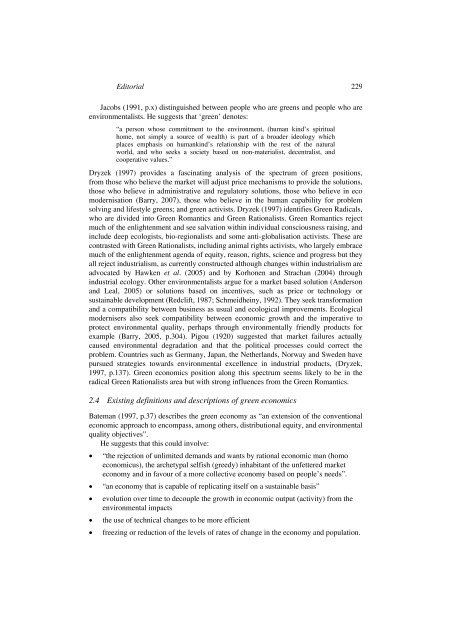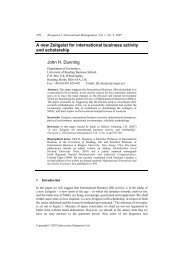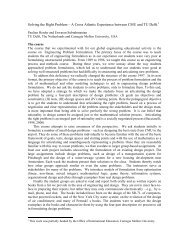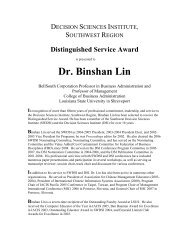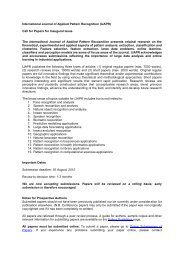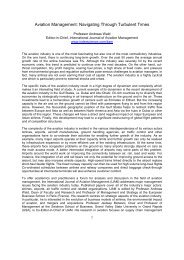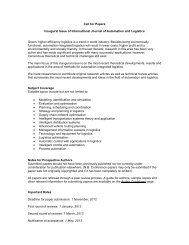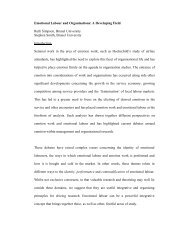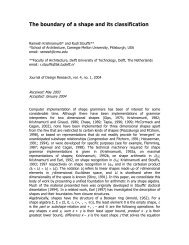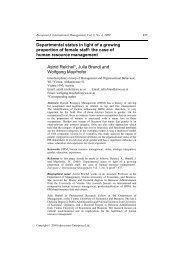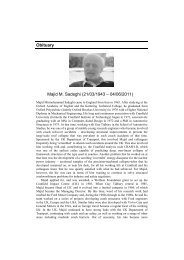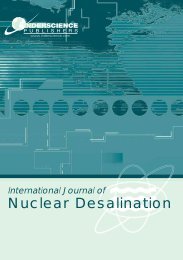Editorial: progress in Green Economics: ontology, concepts and ...
Editorial: progress in Green Economics: ontology, concepts and ...
Editorial: progress in Green Economics: ontology, concepts and ...
Create successful ePaper yourself
Turn your PDF publications into a flip-book with our unique Google optimized e-Paper software.
<strong>Editorial</strong> 229<br />
Jacobs (1991, p.x) dist<strong>in</strong>guished between people who are greens <strong>and</strong> people who are<br />
environmentalists. He suggests that ‘green’ denotes:<br />
“a person whose commitment to the environment, (human k<strong>in</strong>d’s spiritual<br />
home, not simply a source of wealth) is part of a broader ideology which<br />
places emphasis on humank<strong>in</strong>d’s relationship with the rest of the natural<br />
world, <strong>and</strong> who seeks a society based on non-materialist, decentralist, <strong>and</strong><br />
cooperative values.”<br />
Dryzek (1997) provides a fasc<strong>in</strong>at<strong>in</strong>g analysis of the spectrum of green positions,<br />
from those who believe the market will adjust price mechanisms to provide the solutions,<br />
those who believe <strong>in</strong> adm<strong>in</strong>istrative <strong>and</strong> regulatory solutions, those who believe <strong>in</strong> eco<br />
modernisation (Barry, 2007), those who believe <strong>in</strong> the human capability for problem<br />
solv<strong>in</strong>g <strong>and</strong> lifestyle greens; <strong>and</strong> green activists. Dryzek (1997) identifies <strong>Green</strong> Radicals,<br />
who are divided <strong>in</strong>to <strong>Green</strong> Romantics <strong>and</strong> <strong>Green</strong> Rationalists. <strong>Green</strong> Romantics reject<br />
much of the enlightenment <strong>and</strong> see salvation with<strong>in</strong> <strong>in</strong>dividual consciousness rais<strong>in</strong>g, <strong>and</strong><br />
<strong>in</strong>clude deep ecologists, bio-regionalists <strong>and</strong> some anti-globalisation activists. These are<br />
contrasted with <strong>Green</strong> Rationalists, <strong>in</strong>clud<strong>in</strong>g animal rights activists, who largely embrace<br />
much of the enlightenment agenda of equity, reason, rights, science <strong>and</strong> <strong>progress</strong> but they<br />
all reject <strong>in</strong>dustrialism, as currently constructed although changes with<strong>in</strong> <strong>in</strong>dustrialism are<br />
advocated by Hawken et al. (2005) <strong>and</strong> by Korhonen <strong>and</strong> Strachan (2004) through<br />
<strong>in</strong>dustrial ecology. Other environmentalists argue for a market based solution (Anderson<br />
<strong>and</strong> Leal, 2005) or solutions based on <strong>in</strong>centives, such as price or technology or<br />
susta<strong>in</strong>able development (Redclift, 1987; Schmeidhe<strong>in</strong>y, 1992). They seek transformation<br />
<strong>and</strong> a compatibility between bus<strong>in</strong>ess as usual <strong>and</strong> ecological improvements. Ecological<br />
modernisers also seek compatibility between economic growth <strong>and</strong> the imperative to<br />
protect environmental quality, perhaps through environmentally friendly products for<br />
example (Barry, 2005, p.304). Pigou (1920) suggested that market failures actually<br />
caused environmental degradation <strong>and</strong> that the political processes could correct the<br />
problem. Countries such as Germany, Japan, the Netherl<strong>and</strong>s, Norway <strong>and</strong> Sweden have<br />
pursued strategies towards environmental excellence <strong>in</strong> <strong>in</strong>dustrial products, (Dryzek,<br />
1997, p.137). <strong>Green</strong> economics position along this spectrum seems likely to be <strong>in</strong> the<br />
radical <strong>Green</strong> Rationalists area but with strong <strong>in</strong>fluences from the <strong>Green</strong> Romantics.<br />
2.4 Exist<strong>in</strong>g def<strong>in</strong>itions <strong>and</strong> descriptions of green economics<br />
Bateman (1997, p.37) describes the green economy as “an extension of the conventional<br />
economic approach to encompass, among others, distributional equity, <strong>and</strong> environmental<br />
quality objectives”.<br />
He suggests that this could <strong>in</strong>volve:<br />
• “the rejection of unlimited dem<strong>and</strong>s <strong>and</strong> wants by rational economic man (homo<br />
economicus), the archetypal selfish (greedy) <strong>in</strong>habitant of the unfettered market<br />
economy <strong>and</strong> <strong>in</strong> favour of a more collective economy based on people’s needs”.<br />
• “an economy that is capable of replicat<strong>in</strong>g itself on a susta<strong>in</strong>able basis”<br />
• evolution over time to decouple the growth <strong>in</strong> economic output (activity) from the<br />
environmental impacts<br />
• the use of technical changes to be more efficient<br />
• freez<strong>in</strong>g or reduction of the levels of rates of change <strong>in</strong> the economy <strong>and</strong> population.


